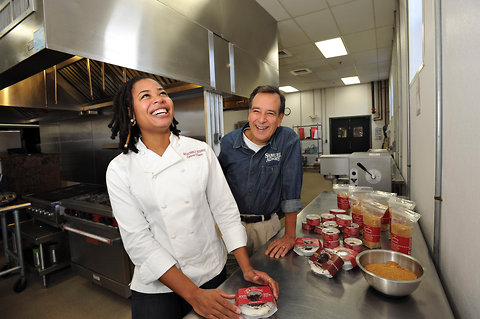 Gretchen Ertl for The New York Times Carlene O’Garro and Jim Koch inside the kitchen at Boston Beer Company.
Gretchen Ertl for The New York Times Carlene O’Garro and Jim Koch inside the kitchen at Boston Beer Company.
The Agenda
How small-business issues are shaping politics and policy.
We have just published an article exploring what appears to be a burgeoning trend among big businesses: helping small businesses — with loans, mentoring, new opportunities and sometimes a combination of all three. While the story focuses on the efforts of Boston Beer Company, large companies across the commercial spectrum, including financial giants and national retailers, have joined in.
But if you ask Matthew Griffin, a small-business owner in Carmel, Ind., what’s the best thing big businesses can do to help small businesses, he would probably say: pay their bills promptly.
Mr. Griffin, owns Baker’s Edge, which makes serpentine baking pans (“The Brownie Pan for Edge Lovers!”) sold at specialty kitchen stores and some catalogs. In 2009, he said, several of the retailers he sells to announced in mid-contract that they were changing their payment terms to 90 days from 30 days, which had been standard. Another one of his retailers, Costco Wholesale, Mr. Griffin said, insisted from the outset that it would pay bills in 60 days.
“I’m burning up my line of credit, paying interest, and they’re dragging their feet,” said Mr. Griffin, who employs two people directly and said he supports the equivalent of another three to six jobs at the contract factory in Minnesota that makes his pans. “You’re the smallest guy on the totem pole, and you feel like you’re carrying the largest amount of risk and debt to feed the larger beast.”
In recent years, giant companies — and not just retailers — have used their size to rewrite the rules for paying the small businesses that supply them with inventory, products for own their use, and services. And though Mr. Griffin first noticed this after the recession hit, many of the companies engaging in this practice are not exactly hard up for cash.
In early 2011, Jeffrey Leonard, a clean-tech private equity fund manager, wrote in the Washington Monthly that Cisco Systems was increasing its payment time from 30 to 60 days, despite handsome profits and nearly $39 billion in cash on its balance sheet. In June, the Wall Street Journal reported that Apple, Wal-Mart, and Ford Motor Company were among corporations that had increased the amount of time they take to pay vendors. And Costco, which takes 60 days to pay Mr. Griffin, has about $5 billion on hand.
Alan Bubitz, a vice president and general merchandise manager at Costco, said that at that store, payment times to vendors are negotiated and are generally tied to the time it takes to sell the merchandise. “We want to sell the merchandise before we have to pay for it, and in essence the vendor will fund the inventory,” Mr. Bubitz said. “So if it takes us 60 days to sell the merchandise, and he wants to be paid in 10, we’re sitting on the cost of money. It’s not a very good way to do business.”
The founder of Boston Beer, Jim Koch, said that when he was starting out, he, too, had difficulty getting customers to pay, which of course rankled him, since many of his customers were “large, well-capitalized businesses, while I was scrounging for money and paying credit card rates.”
His solution? He asked his customers if they would pay him in five days rather than 30, just for the first year. “I would explain to them, I’m just starting out,” he said, “I’m solid — ’cause you don’t want them to think you’re going to go broke — but if you pay me faster, I’m going to put it back into Sam Adams, and you’ll make more money selling it.”
More often than not, Mr. Koch said, simply posing the question worked. If it didn’t, he’d offer a 1- percent discount for a five-day payment. “Every company has standard practices around this sort of thing. It doesn’t mean it’s not negotiable,” Mr. Koch said. “There’s always someone with discretion, to help you out. Most small businesses don’t ask, and if they do, they take the first no. Generally, the first person you deal with doesn’t have the discretion to change the policy. Don’t take no from somebody who’s not authorized to say yes.”
You’re more likely to get that yes, Mr. Koch said, if you couch the proposition in “win-win” terms. “It doesn’t have to be business or financial — it can be a good deed,” he said. “It makes people feel good to say yes. And as a customer, they generally want to see you succeed.”
As for the terms Boston Beer sets for its own vendors, a spokesman e-mailed to say that payment is on average 45 days, “but there is a significant range around that average.” In our conversation, Mr. Koch said that payment varied by the type of transaction. “Some people you E.F.T.” — electronic funds transfer — “money right away, some you pay in 30 days, some we pay in 60 days.”
But, he said, the distinction is not based on the vendor’s size. And “if somebody asks us to pay them early, then we’ll pay them faster,” he continued. “We might ask for a 1-percent discount. But like most things, it’s ultimately negotiable.”
What’s been your experience? Are you having problems getting big companies to pay quickly? Have you tried to negotiate with them? And what do you make of Boston Beer’s efforts to help small food and beverage businesses?
Article source: http://boss.blogs.nytimes.com/2012/11/14/theres-a-great-way-big-businesses-could-help-small-businesses/?partner=rss&emc=rss